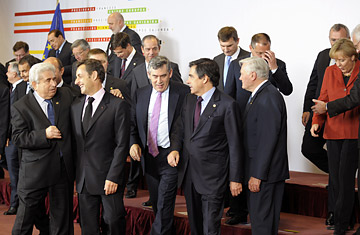
European Council Ministers
French President Nicolas Sarkozy is not the sort to let a grim outlook undermine his trademark determination. So despite the chorus of warnings against expecting conclusive results from this Saturday's G-20 summit in Washington on the world's crisis-stricken financial system, Sarkozy says he'll accept nothing short of tangible progress toward "moralizing finance markets."
"Let this be very clear: If I don't get concrete results, I'll take off," Sarkozy warned Saturday following a meeting of European Union heads to prepare a common position for the Nov. 15 summit. "I'll leave Washington and come home." (See Today in Pictures.)
The pilots of France's presidential Airbus may want to keep their engines idling. For despite the enduring crisis and darkening recession, few participants or observers of the summit believe the gathering will accomplish anything beyond initiating a very long and still murky effort to address some of the factors that led to the rot and implosion of U.S. financial markets and its contamination abroad. "We are not hoping for much from the G-20 meeting," admitted Brazilian President Luiz Inácio Lula da Silva on Tuesday. "It is only the start, even if it is a promising one."
To optimists, the mere fact that Sarkozy convinced regulation-wary U.S. President George W. Bush to host and attend such a summit was cause for hope. Just maybe, the thinking went, the severity of the crisis would force even American free-market fundamentalists to rethink their aversion to additional rules — especially to multilaterally binding measures enforced by international organizations. But since then, the lame-duck Bush Administration has signaled its opposition to any significant change to the current system of national regulations. And though President-elect Barack Obama's decision not to attend the event disappointed Sarkozy and other European leaders, some hope he'll be attentive to the concerns and proposals aired in his absence. (See pictures of President Bush in the Middle East.)
"Even if Saturday's meeting will mostly be theatrics and promises to hold future meetings, Sarkozy needs to go and speak to Bush in order to send a message to Obama," says French political analyst Alain Duhamel. "What that will say is Sarkozy and Europe are mobilized and determined to regulate markets collectively, and that Obama is going to have to deal with that push from his foreign allies — especially if the situation remains this dire through Obama's Inauguration."
Good luck with that, responds Terry Miller, director of the Center for International Trade and Economics at the conservative Heritage Foundation think tank in Washington. Miller says that while certain common agreements to increase transparency of financial markets may be acceptable, Obama — like Bush — won't "allow large and vital sectors of America's economy that thrive on innovation to be fenced in" by international accords. And while he thinks Sarkozy's efforts to raise expectations about what the summit can achieve are misguided, Miller does see a logic to meeting to discuss the crisis.
"Confidence is critical to economies, and to financial companies and markets in particular," Miller says. "And if getting together to discuss the situation and making cooperative statements promising to reverse the recent spiral of negativity with stability can help restore confidence, then the effort is probably worth it. But someone as smart as Sarkozy knows the effort to get an American President to submit a pillar of his economy to outside regulators just isn't going to happen."
Resistance may not be limited to the U.S. Following Saturday's meeting of E.U. leaders, some contested Sarkozy's contention that a "fairly detailed common position by Europe" had been found. Czech Prime Minister Mirek Topolanek retorted that the E.U. had given Sarkozy, who will be attending not just as President of France but also as the current holder of the E.U.'s rotating presidency, a "vague mandate" for Washington that reflected "the divergent opinions on the way things should be handled." Luxembourg Prime Minister Jean-Claude Juncker, presumably piqued at the idea of his nation's tradition of bank secrecy being threatened by international finance regulation, pointedly noted that "those demanding far-reaching coordination of economic policies apply such rules themselves" — a jab at Sarkozy's own French budgets violating E.U. rules that limit deficits to 3% of GNP. (See pictures of France celebrating Bastille Day.)
Such grousing contrasts with the cheers Sarkozy drew during the darkest hours of the crisis with his clarion calls for a "refoundation of modern capitalism." Also waning is the general enthusiasm unleashed by British Prime Minister Gordon Brown's appeal to establish a "new Bretton Woods [by] building a new international financial architecture" — a revision of the original 1944 accords that envisioned turning the International Monetary Fund (IMF) into a global regulator of markets unified under common rules.
Instead, most participants now seem resigned to meeting Saturday in Washington to compare notes, set another meeting after Obama takes power and then see what future international accords, if any, are feasible. "Lots of people are talking about a 'Bretton Woods 2,' but we won't be concluding a new international treaty," warned IMF chairman Dominique Strauss-Kahn. "Things aren't going to change over night."
Probably true — and just the sort of thing Sarkozy risks chewing on bitterly during an early flight back to Paris.
